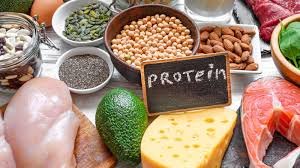Are you eating enough protein? Probably not!
In the land of abundance, where fast-food joints and convenience stores are on every corner, one would assume that Americans have no trouble meeting their nutritional needs. However, there is a paradoxical issue at play – despite having easy access to a variety of foods, many Americans are not consuming enough protein. This deficiency in protein intake is not only detrimental to overall health but also significantly contributes to the country's obesity epidemic. I want to explore the importance of protein, why many Americans fall short, and the connection between protein deficiency and obesity.
The Role of Protein:
Protein is often referred to as the building block of life for good reason. It plays a crucial role in building and repairing tissues, supporting immune function, and maintaining muscle mass. Additionally, protein promotes feelings of fullness, which can help curb overeating and assist in weight management. When you do not consume enough protein, your bodies can suffer from various health issues, including muscle weakness, fatigue, and slower metabolism.
The American Protein Gap:
Despite the importance of protein, many Americans are not getting an adequate amount in their diets. This protein gap can be attributed to several factors, including the rise of processed foods, sedentary lifestyles, and misconceptions about dietary needs. Fast food and convenience meals, often high in carbohydrates and fats but lacking in protein, have become staples for many families, leading to a deficiency in this essential nutrient.
The lack of protein in the American diet is closely tied to the rising rates of obesity. When individuals don’t consume enough protein, they may experience constant feelings of hunger and an increased desire to snack on unhealthy, calorie-dense foods. This can lead to overeating and, eventually, weight gain. Moreover, protein deficiency can also result in the loss of lean muscle mass, further slowing down the metabolism and making it harder to burn calories efficiently.
Breaking the Cycle:
To address the protein deficiency issue and combat obesity, it is crucial for Americans to prioritize protein-rich foods in their diets. Incorporating lean meats, poultry, fish, eggs, dairy products, legumes, nuts, and seeds can significantly enhance protein intake. Additionally, educating the public about the importance of protein and providing easy access to nutritious, protein-packed foods can make a significant difference.
How Much is Enough:
If you want to lose weight, aim for a daily protein intake between 0.73 and 1 gram per pound of body weight. Athletes and heavy exercisers should consume 1-1.5 grams of protein per pound if aiming for weight loss.
My practical recommendation to people is that if you carry a body fat percentage above 25-30% it makes more sense to base your protein recommendations off of your goal weight.
It’s not just about eating less; it’s about eating right and ensuring that our bodies receive the essential nutrients they need to thrive. Let’s bridge the protein gap and work together to combat the obesity epidemic one nutritious meal at a time. And as always, please reach out to me if I can help you in your wellness journey!


